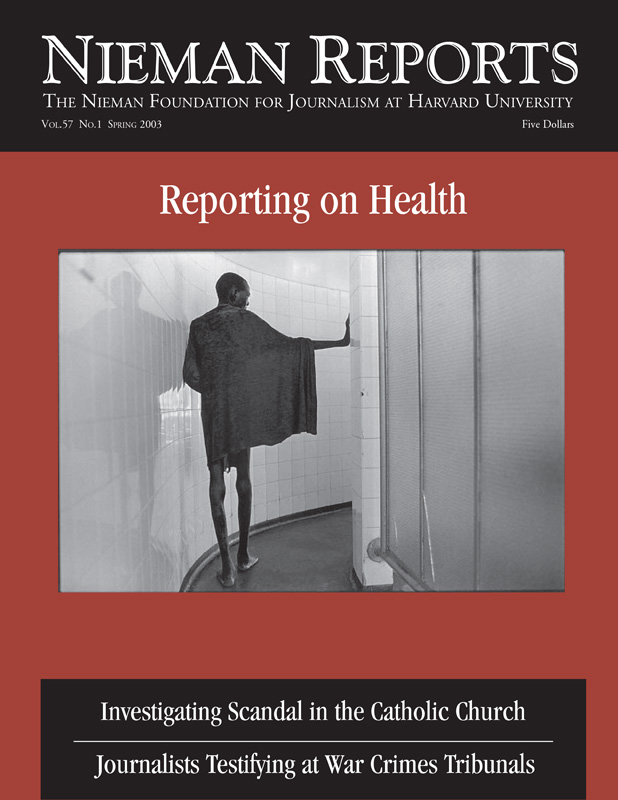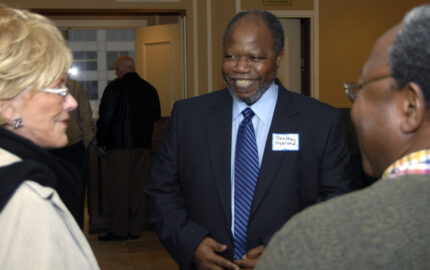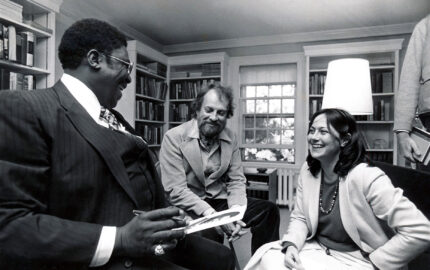At no point in his career did Zimbabwean journalist Geoffrey Nyarota imagine, as he tried to contribute to a better society in his country by being a freethinking journalist, that his road would be anything but rocky. However, little had prepared him for the fact that along the way his offices would be bombed, there would be arbitrary weekly arrests and threats of physical violence, and death. In short, the gamut of skullduggery only a thoroughly repressive system is capable of.
For Nyarota, the final obstacle was put in his path when the board of directors of his newspaper, the Daily News, sacked him a few months ago. He learned of his firing by unconventional means—a radio news bulletin, which is one of the surest indications in Africa that a job has been lost at the instigation of forces in “high places.” Nyarota, who arrived at Harvard in January for his Nieman Fellowship, explains, “In effect, when I lost my job it meant I no longer had the institutional protection the newspaper had afforded me. Also, I suddenly found out that all my friends had abandoned me and that the police were looking for me.”
He knew then that it was time to leave what he had been trying to do in Zimbabwe. With nothing more than a few belongings hastily thrown in a suitcase, he slipped into neighboring South Africa, where he was soon joined by his wife, Virginia, and two of their three children.
Soon afterwards, the Committee to Protect Journalists (CPJ) alerted the Nieman Foundation of Nyarota’s plight. The foundation took emergency steps to appoint him a Nieman Fellow and to get him and his family to the United States. “It is with a feeling of great relief that I am here, and it is my fervent hope that what I gain as a Nieman Fellow I will use to benefit independent journalism in Zimbabwe,” Nyarota tells me as he reclines on a settee in the apartment that is his family’s new home in Cambridge.
Nyarota becomes a Nieman after devoting more than two decades of his life to journalism in Africa. He is among that continent’s most prominent newspaper editors. During his career, he displayed extraordinary levels of courage in exposing graft, larceny and all kinds of unethical behavior by the powerful interests in his country. He founded the Daily News in 1999 upon his return from Mozambique, where he had gone into exile because of reporting that exposed a vehicle-dealing scam involving some of the highestranking government officials.
The Zimbabwean editor’s stature and that of the Daily News in African journalism were firmly established by the resolve and courage with which they undertook the highly risky venture of fighting President Robert Mugabe’s ruinous land-grab policy and the violence this policy unleashed on both white and black citizens. After all, Mugabe’s government thinks nothing of arresting, detaining and badly torturing journalists as a way of trying to control what is published, as Zimbabwean journalists Ray Choto and the late Mark Chavunduka, a 2000 Nieman Fellow, discovered to their peril.
For his work, Nyarota has won a string of international journalism awards, among them a CPJ award in 2001 in New York City and the World Association of Newspapers’ Golden Pen last year. But these came with a very heavy price. What the state and its hired thugs had in store for the Daily News and its journalists was an unprecedented campaign of violence and intimidation. A year after the Daily News first was published, a bomb blast went off underneath the newspaper’s building. No serious investigation into the cause nor arrests were made. Not long after, an even more powerful blast destroyed the paper’s presses. Confronted by all of these problems, the publication began to hemorrhage money.
Like a recurring nightmare, Nyarota became a frequent occupant of Harare’s police cells. He was charged under the country’s draconian press laws on widely interpretable charges such as criminal defamation against the president. When a state security operative casually informed Nyarota in an elevator that he had been instructed to assassinate him and then tried to extort him and a colleague of a large sum of money, it did little for badly frayed nerves at the Daily News. Nerves were already stretched by the abduction by hired thugs of some of the newspaper’s writers and the fact that Mugabe’s Information Minister Jonathan Moyo had told one journalist to her face that they would begin targeting individual journalists with the paper.
By the time he got sacked, Nyarota’s departure from Zimbabwe was well overdue.
His story is one lived daily by courageous journalists all over Africa, albeit with varying degrees of severity. As in Zimbabwe, journalists often lock horns against more powerful and ruthless forces. But then they also have to contend against factors not directly related to reportorial work, but that are no less a hindrance to the development of a free press, including very poor facilities, economies so weak that advertisement markets hardly exist, ever diminishing readerships due to economic hardships, and other demoralizing effects on journalists.
For such journalists at Nyarota, being granted a Nieman fellowship seems a godsend.
Shyaka Kanuma, a 2003 Nieman Fellow, is a freelance contributor to The Mail and Guardian in Johannesburg, South Africa. Kanuma began his journalism career as a reporter in Rwanda for a government- owned weekly, The New Times. Having a long-time passion for journalism and a strong desire to contribute to the rebuilding of Rwanda through his work as a reporter, Kanuma was seriously disappointed by the lack of independent journalism he found at The New Times. He felt that truth was sacrificed for political expediency and blatant corruption was ignored. Within seven months of starting his work at The New Times, he resigned. Kanuma then became a stringer for The New Vision, a Ugandan daily, and The East African, a regional weekly. While working for those papers, he and a few other journalists developed plans for an investigative weekly, Rwanda Newsline. The idea, Kanuma said, was to “expose corruption and incompetence in high places, helping to create a vibrant civil society.” However, the new weekly was up against the strength and determination of those in power, who wanted to drive Rwanda Newsline out of business. After barely two years, the weekly was forced to close because of government harassment and interference with the paper’s advertisers. Although the paper closed, it had set the journalistic standard in Rwanda, and Kanuma was the first reporter in the country to win a continental award—CNN’s Free Press Africa Award in Johannesburg, South Africa
For Nyarota, the final obstacle was put in his path when the board of directors of his newspaper, the Daily News, sacked him a few months ago. He learned of his firing by unconventional means—a radio news bulletin, which is one of the surest indications in Africa that a job has been lost at the instigation of forces in “high places.” Nyarota, who arrived at Harvard in January for his Nieman Fellowship, explains, “In effect, when I lost my job it meant I no longer had the institutional protection the newspaper had afforded me. Also, I suddenly found out that all my friends had abandoned me and that the police were looking for me.”
He knew then that it was time to leave what he had been trying to do in Zimbabwe. With nothing more than a few belongings hastily thrown in a suitcase, he slipped into neighboring South Africa, where he was soon joined by his wife, Virginia, and two of their three children.
Soon afterwards, the Committee to Protect Journalists (CPJ) alerted the Nieman Foundation of Nyarota’s plight. The foundation took emergency steps to appoint him a Nieman Fellow and to get him and his family to the United States. “It is with a feeling of great relief that I am here, and it is my fervent hope that what I gain as a Nieman Fellow I will use to benefit independent journalism in Zimbabwe,” Nyarota tells me as he reclines on a settee in the apartment that is his family’s new home in Cambridge.
Nyarota becomes a Nieman after devoting more than two decades of his life to journalism in Africa. He is among that continent’s most prominent newspaper editors. During his career, he displayed extraordinary levels of courage in exposing graft, larceny and all kinds of unethical behavior by the powerful interests in his country. He founded the Daily News in 1999 upon his return from Mozambique, where he had gone into exile because of reporting that exposed a vehicle-dealing scam involving some of the highestranking government officials.
The Zimbabwean editor’s stature and that of the Daily News in African journalism were firmly established by the resolve and courage with which they undertook the highly risky venture of fighting President Robert Mugabe’s ruinous land-grab policy and the violence this policy unleashed on both white and black citizens. After all, Mugabe’s government thinks nothing of arresting, detaining and badly torturing journalists as a way of trying to control what is published, as Zimbabwean journalists Ray Choto and the late Mark Chavunduka, a 2000 Nieman Fellow, discovered to their peril.
For his work, Nyarota has won a string of international journalism awards, among them a CPJ award in 2001 in New York City and the World Association of Newspapers’ Golden Pen last year. But these came with a very heavy price. What the state and its hired thugs had in store for the Daily News and its journalists was an unprecedented campaign of violence and intimidation. A year after the Daily News first was published, a bomb blast went off underneath the newspaper’s building. No serious investigation into the cause nor arrests were made. Not long after, an even more powerful blast destroyed the paper’s presses. Confronted by all of these problems, the publication began to hemorrhage money.
Like a recurring nightmare, Nyarota became a frequent occupant of Harare’s police cells. He was charged under the country’s draconian press laws on widely interpretable charges such as criminal defamation against the president. When a state security operative casually informed Nyarota in an elevator that he had been instructed to assassinate him and then tried to extort him and a colleague of a large sum of money, it did little for badly frayed nerves at the Daily News. Nerves were already stretched by the abduction by hired thugs of some of the newspaper’s writers and the fact that Mugabe’s Information Minister Jonathan Moyo had told one journalist to her face that they would begin targeting individual journalists with the paper.
By the time he got sacked, Nyarota’s departure from Zimbabwe was well overdue.
His story is one lived daily by courageous journalists all over Africa, albeit with varying degrees of severity. As in Zimbabwe, journalists often lock horns against more powerful and ruthless forces. But then they also have to contend against factors not directly related to reportorial work, but that are no less a hindrance to the development of a free press, including very poor facilities, economies so weak that advertisement markets hardly exist, ever diminishing readerships due to economic hardships, and other demoralizing effects on journalists.
For such journalists at Nyarota, being granted a Nieman fellowship seems a godsend.
Shyaka Kanuma, a 2003 Nieman Fellow, is a freelance contributor to The Mail and Guardian in Johannesburg, South Africa. Kanuma began his journalism career as a reporter in Rwanda for a government- owned weekly, The New Times. Having a long-time passion for journalism and a strong desire to contribute to the rebuilding of Rwanda through his work as a reporter, Kanuma was seriously disappointed by the lack of independent journalism he found at The New Times. He felt that truth was sacrificed for political expediency and blatant corruption was ignored. Within seven months of starting his work at The New Times, he resigned. Kanuma then became a stringer for The New Vision, a Ugandan daily, and The East African, a regional weekly. While working for those papers, he and a few other journalists developed plans for an investigative weekly, Rwanda Newsline. The idea, Kanuma said, was to “expose corruption and incompetence in high places, helping to create a vibrant civil society.” However, the new weekly was up against the strength and determination of those in power, who wanted to drive Rwanda Newsline out of business. After barely two years, the weekly was forced to close because of government harassment and interference with the paper’s advertisers. Although the paper closed, it had set the journalistic standard in Rwanda, and Kanuma was the first reporter in the country to win a continental award—CNN’s Free Press Africa Award in Johannesburg, South Africa



